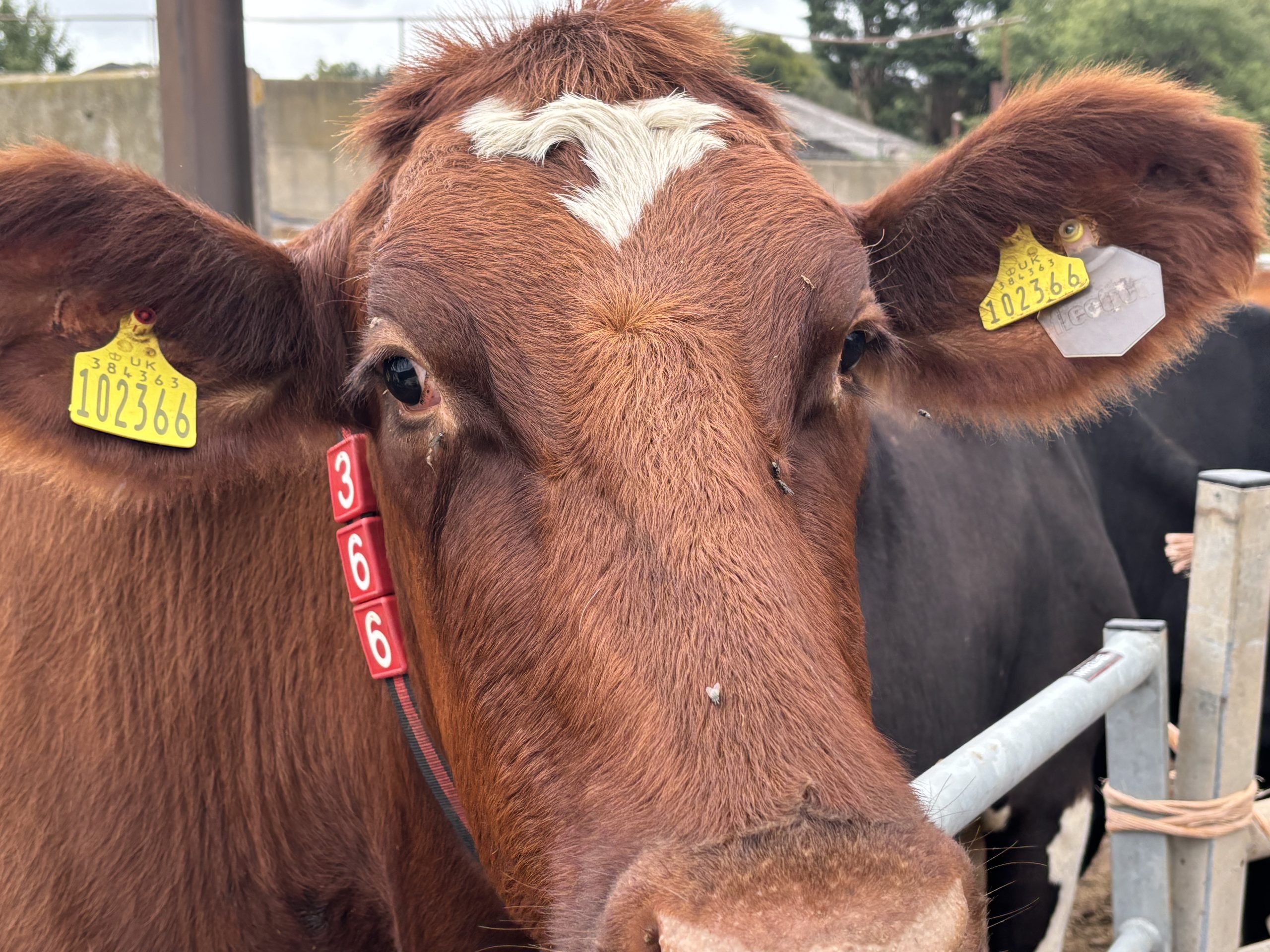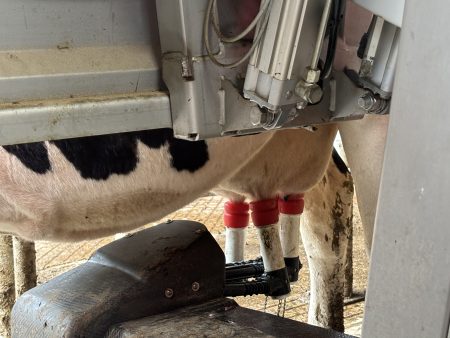How long does it take to train a cow?
 And how exactly do you do it?
And how exactly do you do it?
The answer, as I found out on a visit to Dartington Hall estate’s newest tenant farmer, is about two months – and bribery.
The brown Ayrshire cows which give How Now Dairy its name, are settling in to their new pastures, having moved from Ladywell Farm at Ugborough. As we know, moving home is stressful but these girls are getting into a routine which allows them to be milked when they want. Led by Mac the dog and his owner Ollie Lee, the herd is being trained to come to the parlour and then walk back through the right gate to the next paddock – where a fresh crop of grass is waiting.
Ollie explains the system. “There are three paddocks. At 2am, 10 am and 6 pm the gate will change direction to a fresh paddock, so the cows will learn. The paddock will only have enough food for that number of cows for eight hours, so they polish it off in about two hours, then spend six hours cudding (digesting) and then they’ll go “oh I could do with a bit more food now”, because cows are inherently greedy. So the cows will walk back to the parlour, get milked by the robot milker (if they are allowed – if they don’t have enough milk they are directed back out), be fed some cow cake while there and then get released.”
It’s all bribery with cows.

The whole thing operates via the cow’s own radio frequency collar which tells the machinery which cow is which and when it was last milked. In the early morning the cows queue up – although apparently some of the older ladies do like to barge to the head of the line – and get their cake, which is a big draw.
The milking machine is laser guided and recognises each udder, cleaning and massaging each teat before attaching itself to extract the milk. Once done, it gives the teats a wash and off the cow
goes. Ollie says: “It is very relaxing for them. The robots are the same every time – they never turn up late, never come with a hangover, they never wake up the wrong side of the bed. The cows release oxytocin, a pleasure hormone, which is good for them.”
“But if we run out of cow cake they very quickly go on strike. It’s all bribery with cows.”
All the milk goes back to Ladywell, Ollie’s family farm, for pasteurising and packaging – not bottling though, rather “paperbagging”. None is sold to bulk buyers. As Ollie said, this means all the money earned stays in the local economy, rather than being skimmed off by processors and supermarkets. He is proud that the packaging is completely compostable – customers return their “empties” just like glass bottles would be and they are composted on the farm to go back on the land.
 He believes How Now is the only dairy farm in the Uk to have 100 per cent compostable packaging. Customers place orders online and get a weekly delivery. “You can walk through the grass that will be your milk next week – you can’t do that when you buy it from a supermarket,” he says. And the grass is key. In fact, the soil is where the magic lies. The 400 acres he now has on a twenty year tenancy was organic, is now out of licence and and is being brought back to full organic status with intense care. Herbal leys of red clover and chicory have been planted and are thriving. The chicory’s deep roots break up the soil allowing air out and water in, then good bacteria and fungi will follow.
He believes How Now is the only dairy farm in the Uk to have 100 per cent compostable packaging. Customers place orders online and get a weekly delivery. “You can walk through the grass that will be your milk next week – you can’t do that when you buy it from a supermarket,” he says. And the grass is key. In fact, the soil is where the magic lies. The 400 acres he now has on a twenty year tenancy was organic, is now out of licence and and is being brought back to full organic status with intense care. Herbal leys of red clover and chicory have been planted and are thriving. The chicory’s deep roots break up the soil allowing air out and water in, then good bacteria and fungi will follow.
As the weather becomes wetter in winter and drier in summer, building in climate change resilience is vital. Ollie plans to plant trees in alleyways in fields to help water retention and provide shade for the cows. It’s a 30 year project, but he says that already the business is carbon negative. “We measure the carbon we release and store and we store more CO2 than the entire business releases, and that takes the methane from the cows into account.”
I ask if certain plants give milk any flavour and am delighted to learn that mint would give minty milk, handy if you want a quick mint choc-chip ice cream. Crops to avoid are buttercups – sour – kale – very sulphury – and wild garlic – for obvious reasons.

Farming has its ups and downs, aside from weather. Recently Ollie lost six cows to bovine TB. I ask his opinion of the badger cull, which began in 2013 and came to South Devon in 2016. It ended here last year. The Government has pledged to end the multi-million pound UK badger cull by 2029. Last year more than 17,000 badgers were killed. In Devon a total of 40,000 animals have been killed. “As destructive as it was, I do think it was beneficial to cattle. We lost six beautiful cows. It could have been the wild population of deer or badgers, or from within cows bought in,” Ollie said. Ollie supports vaccination of cattle as a fantastic idea but there are hurdles, it seems – not least that if a cow was vaccinated, it would test positive on a TB skin test! It would also, he says, need the whole UK herd to be vaccinated while routine testing was going on, and cattle movements would have to stop. That thorny problem is for Government to solve.
Meanwhile Ollie and his 35 milkers and 43 in-calf heifers are happily settling in to their new pastures. In time the herd will expand.
If you want to see the farm in action there is an open day coming up on September 21 which will feature food from How Now’s local suppliers.

